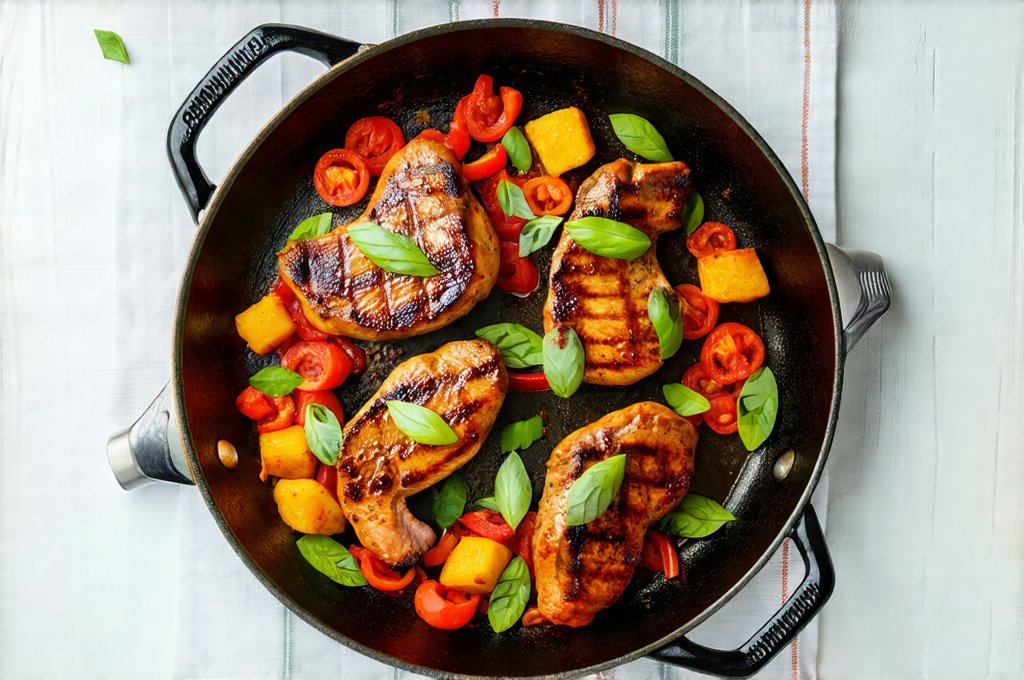The modern lifestyle often leaves us short on time, leading to quick-fix meal solutions that can sometimes wreak havoc on our digestive systems. Processed foods, large portion sizes, and rushed eating habits contribute to discomfort like bloating, gas, and indigestion – issues many of us experience regularly. But what if creating a nourishing, delicious and easily digestible dinner didn’t require hours in the kitchen? It absolutely can! The key lies in simplifying our approach to cooking and focusing on whole foods prepared in ways that support optimal digestion.
One-pan meals offer an elegant solution. Not only do they minimize cleanup – a huge win for busy weeknights – but they also encourage mindful ingredient combinations. By prioritizing easily digestible ingredients like lean proteins, gentle vegetables, and healthy fats, we can create dinners that are both satisfying and kind to our gut. This isn’t about restrictive diets or eliminating entire food groups; it’s about making informed choices that support a happy and healthy digestive system, one delicious meal at a time. The following recipes and tips aim to empower you to take control of your dinner routine and nourish yourself from the inside out. Considering how stress impacts digestion, exploring daily probiotic practices can be very beneficial for busy parents.
Building Blocks for Digestive Wellness
Digestive health is complex, but some foundational principles apply across the board. First, fiber plays a crucial role – but it’s not always about more fiber; it’s about the type of fiber. Soluble fiber, found in oats, barley, and many fruits and vegetables, draws water into the digestive tract, softening stool and promoting regularity. Insoluble fiber, prevalent in whole grains and some vegetable skins, adds bulk, speeding up digestion. A balance is ideal. Second, hydration is paramount; water helps move food through the digestive system smoothly. Finally, mindful eating – savoring each bite, chewing thoroughly, and avoiding distractions – allows your body to properly prepare for digestion and absorb nutrients effectively.
Many common ingredients can be gently modified to improve digestibility. For example, steaming or roasting vegetables instead of frying them reduces fat content and makes them easier on the stomach. Similarly, marinating lean proteins in tenderizing agents like lemon juice or yogurt breaks down tough fibers. Spices aren’t just for flavor; many – like ginger, turmeric, and cumin – possess anti-inflammatory properties that can soothe the digestive tract. Avoiding overly processed foods, excessive sugar, and artificial sweeteners is also key. The goal isn’t perfection but a conscious effort to prioritize whole, nourishing ingredients. When dealing with sensitive digestion, preparing simple meals during recovery can be especially helpful.
One-pan meals are perfectly suited for incorporating these principles. They naturally encourage ingredient combinations that support digestion – think salmon with steamed broccoli and quinoa – and the minimal prep time allows you to focus on mindful cooking practices. This approach removes stress from dinner preparation, making healthy eating a sustainable lifestyle choice rather than a chore. Understanding gut-brain interactions can further refine your meal planning for digestive calm.
One-Pan Dinner Ideas: Recipes & Inspiration
Here are some starting points for building your own digestive-friendly one-pan dinners. Remember to adjust portion sizes based on your individual needs and preferences. A simple baked salmon with roasted asparagus and sweet potato is a fantastic option. Season the salmon with dill, lemon juice, and a drizzle of olive oil. Toss the asparagus and sweet potato in olive oil, salt, and pepper before roasting alongside the fish. Another great choice is chicken breast with Brussels sprouts and brown rice. Marinate the chicken in yogurt and herbs for extra tenderness.
For vegetarian options, consider roasted chickpeas with Mediterranean vegetables (zucchini, bell peppers, eggplant) and quinoa. Season generously with cumin, paprika, and a touch of chili powder. Or try tofu with steamed green beans and wild rice, flavored with ginger and soy sauce. The beauty of one-pan meals is their versatility – feel free to experiment with different combinations based on your favorite flavors and dietary needs. Don’t be afraid to add fresh herbs like parsley or cilantro for an extra boost of flavor and nutrients. When planning these meals, consider smart grocery shopping to ensure you have everything you need for a week of digestive comfort.
Gentle Cooking Methods
Cooking method significantly impacts digestibility. Harsh cooking methods can sometimes make food harder to break down, exacerbating digestive issues. For example, deep-frying introduces excess fat and can irritate the stomach lining. Instead, prioritize gentle techniques like:
- Steaming: Preserves nutrients and makes vegetables incredibly tender.
- Roasting: Enhances flavor while maintaining a relatively light texture. Use moderate temperatures to avoid burning.
- Baking: A versatile method suitable for proteins, vegetables, and grains.
- Poaching: Ideal for delicate proteins like fish and chicken.
When roasting vegetables, consider adding a splash of water or broth to the pan to create steam, further softening them. Avoid overcrowding the pan, as this can lead to steaming instead of roasting. For proteins, marinating beforehand not only adds flavor but also tenderizes the meat, making it easier to digest. Remember that even seemingly small adjustments in cooking methods can make a big difference in how your body responds to food. Utilizing soup and stew-based meals is another gentle option for easier digestion.
Spice It Right: Digestive Support Through Flavor
Spices aren’t just about adding deliciousness; many possess powerful digestive benefits. Ginger, for instance, is renowned for its ability to soothe nausea and reduce inflammation. Adding grated ginger to stir-fries or marinades can aid digestion. Similarly, turmeric contains curcumin, a potent anti-inflammatory compound that supports gut health. Sprinkle turmeric into roasted vegetables or add it to soups and stews.
Other beneficial spices include:
– Cumin: Aids in digestion and reduces bloating.
– Fennel: Relieves gas and indigestion.
– Peppermint: Soothes the digestive tract and eases muscle spasms.
– Cardamom: Promotes healthy digestion and reduces inflammation.
Be mindful of spice levels, especially if you have a sensitive stomach. Start with small amounts and gradually increase as tolerated. Combining spices thoughtfully can create flavorful dishes that not only taste amazing but also actively support your digestive well-being. Don’t underestimate the power of flavor!
Mindful Portion Control & Eating Habits
Even the most perfectly prepared meal can cause discomfort if consumed in excessive quantities or without mindful attention. Portion control is key – aim for moderate servings that satisfy your hunger without overwhelming your digestive system. Using smaller plates can visually help with portion sizing. Pay attention to your body’s signals of fullness and stop eating when you feel comfortably satisfied, not stuffed.
Equally important are eating habits. Avoid rushing through meals; take the time to savor each bite. Chew thoroughly – this breaks down food into smaller particles, making it easier for your stomach to digest. Minimize distractions like television or smartphones while eating, as these can lead to mindless overeating. Create a calm and relaxed dining environment. Finally, avoid lying down immediately after eating, as this can contribute to heartburn and indigestion. Allow at least 30 minutes between finishing your meal and reclining. These simple habits can transform your relationship with food and significantly improve your digestive health. For those experiencing acute issues, best practices for preparing meals during flare-ups are essential to consider.


















